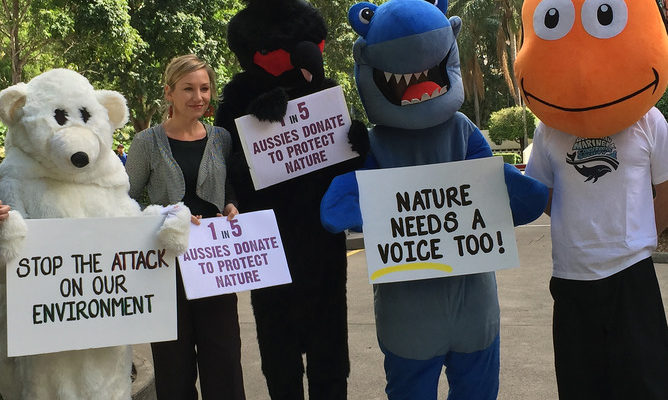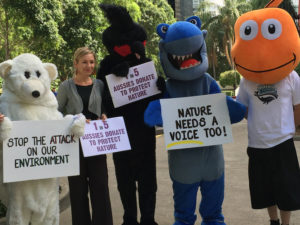

Environmental groups should get involved in politics. AAP Image/Christine Flatley
Should environmental groups that engage in public debate lose their tax-free status?
That’s the focus of a hotly disputed inquiry currently being considered by the Australian government — specifically, by the House of Representatives Standing Committee on the Environment.
Many green groups rely on tax-deductible donations from private citizens and small donors to sustain their work. In Australia, some 600 groups on the environmental register currently qualify. This is comparable to schemes in Europe and the United States, and was initiated to allow citizens and corporations to fund organisations that engage in issues of public interest.
Those who initiated the inquiry, such as the committee’s chair, Liberal MP Matthew Hawke, evidently have no problem with groups that do “on-the-ground” activities, such as planting trees and saving baby flying foxes. But they apparently see red when pondering groups such as Greenpeace, The Wilderness Society and Friends of the Earth, who openly decry some government policies.
Particularly rankling for some conservatives have been campaigns to stop coal developments in Australia.
Bad idea
From our perspective as professional conservation scientists, the government’s inquiry is a bad idea wrapped in naïveté.
For starters, almost all environmental decisions made in Australia have been the result of community advocacy. Dating back to the 19th century, community organisations have pushed governments to legislate for the protection of wildlife and natural habitats. For instance, the NSW Bird Protection Act 1881 was passed because of the Zoological Society of NSW. When it comes to environmental protection, governments have rarely acted in the absence of community pressure.
Furthermore, fair and balanced public debates require input from all sides of an issue. Industry has a long history of funding advocacy groups to promote their agendas — often under the aegis of “community organisations” that actually are little more than industry mouthpieces.
Such environmental wolves in sheep’s clothing include the Australian Environment Foundation – which is on the register of environmental organisations – but has a distinctly anti-environmental agenda. Major corporations such as Dow Chemical, Chevron, the pre-merger Exxon and Mobil, and Philip Morris Tobacco have contributed to scores of other groups with pro-growth, anti-environmental agendas as documented by Sharon Beder in her book Global Spin.
Legitimate environmental groups, however, often achieve their funding via donations from thousands of individuals and the occasional philanthropic donor, rather than a few wealthy natural resource-exploiting corporations (although some environmental groups do partner with corporations in an effort to effect positive changes in their behaviour). Tax-free status is essential for such green groups.
There is also a clear legal precedent for the status quo. In 2010 the High Court of Australia determined in the Aid/Watch Case that advocacy activities aimed at policy or legislative change do not exclude an organisation from being classified as a charity. Such activities were held to contribute positively to public welfare.
Finally, the Australian public is overwhelmingly opposed to the proposal to strip environmental groups of their charitable status. The House Committee solicited public comments to their inquiry, and we assessed every one of them. Of 9,588 submissions, 9,539 (99.5%) were against the proposal, whereas just 28 (0.3%) were in favour (0.2% were neutral or ambiguous). Around 9,000 of the submissions were various types of form letters, although each was submitted by a different individual.
To us, the consensus against the proposal seems obvious. So, why is the government wasting the committee’s time on this inquiry when we have far greater environmental concerns that require bipartisan leadership?

Dangerous trends
In fact, the committee’s inquiry is merely one facet of a broader effort by conservative politicians in Australia to hamstring environmental groups.
As well as moves to curtail green groups’ political activities, reported previously on The Conversation by Peter Burdon, this effort also includes the attempt by Liberal MP Richard Colbeck to ban environmental boycotts, moves to insert gag clauses into the contracts of community legal centres, the defunding of voluntary environmental and heritage organisations, and the drafting of anti-protest laws in states such as Western Australia. Added to this list is the potential prosecution by the Victorian government of a green group that exposed illegal logging practices.
As Burdon emphasises, even if such efforts don’t result in legal changes, they force poorly funded green groups to waste precious time and resources defending themselves.
Notably, this war of environmental attrition isn’t just confined to Australia. There are alarming changes happening all over — most notably in the Asia-Pacific region.
In China, for instance, activists are often hounded while a new law restricting independent organisations is being drafted. Cambodia’s rulers are threatening to “handcuff” any group that stirs up political trouble, while lands-rights activists in Lao are similarly harassed.
India is becoming a poster-child for anti-environmental fervour. A new law there is imposing tight restrictions on activist groups. A leaked report by the country’s Intelligence Bureau claimed — ridiculously — that public campaigns against coal, nuclear and hydroelectric projects, and genetically modified crops were costing the economy 2-3 percentage points of growth a year. And in January a Greenpeace campaigner was prevented from leaving the country because she planned to testify to the British Parliament about coal mining in India.
No brainer
In the coming decades, Australia and the world will face true environmental challenges. These include climate change; dwindling water, forests, biodiversity, and natural resources; and an extra 2 billion to 4 billion people to feed and support. We need real leadership and long-term policies to protect the imperilled ecosystems we all rely on.
Australia is certainly part of the global environmental crisis. We are among the world’s highest per-capita emitters of greenhouse gases — even without counting all the coal we export for others to burn. Our parks and protected areas are being seriously diminished. Forest and woodland destruction has recently accelerated. And in northern Australia, many native wildlife species are experiencing dramatic and mysterious population declines.
Criticism can be uncomfortable for policy makers but it has a crucial role in science and democracy. If governments attempt to limit censure of their policies or of industries, then where is our democratic right to freedom of speech? How do we stand morally above corrupt or authoritarian states that cause so much suffering in the world today, if we advance policies that are clearly intended to stifle self-criticism?
 Susan Laurance and Bill Laurance,
Susan Laurance and Bill Laurance,
Susan Laurance is Associate Professor & ARC Future Fellow at James Cook University.
Bill Laurance is Distinguished Research Professor and Australian Laureate at James Cook University.
This article was originally published on The Conversation.
Read the original article.
Republished by Redlands2030 – 22 June 2015
Please note: Offensive or off-topic comments will be deleted. If offended by any published comment please email thereporter@redlands2030.net
In the dim, dark past we had National parks that were adequately staffed and resourced to undertake wildlife rescue and rehabilitation and pest eradication to name a few of the duties undertaken by Rangers and other staff. Then came budget cuts, rationalization, so much so that some activities could not be undertaken by rangers anymore. Wildlife and environment groups started up, began fundraising, and undertook the wildlife rescue and rehabilitation work. National Parks now mostly licenses rescue organizations who are staffed in the main by volunteers. To take away taxation free status just adds extra burdens to organizations already struggling!
Oh I’m sorry I thought we all live in Australia! A democratic country where we get to think for ourselves and speak for ourselves. This is sounding like a North Korean government directive! If the government is happy to allot a tax-free status to specialist groups who look after the environment, care about our future and work their butts off to preserve the beauty of our country, then these groups should be allowed to have their say – in private and in public. Governments should be glad they have people working towards keeping this country beautiful (the more beautiful it is, the more money the Government can get in from tourism…. $$$$$$$$$$$)
It all starts with that one brave person, who is willing to stand up and have a say about an issue they’ve seen arise, that gets our country into action! A person, or a group of people, debating the pros and cons of a situation allows others to hear the facts and make up their own mind on how they feel about the situation… this is democracy! It is allowing people to learn and grow and make informed decisions that will in time help shape this gorgeous country of ours. This is how we learn about our community, our state and our country. If everyone remained silent then we’d have to rely on the government communication for thoughts and ideas (very North Korean and dictatorial), and that would indeed be a very, very sad state of affairs! Some of the so called `ideas’ that come from the mouths of politicians are astounding! I’m all for allowing people to have their own thoughts and comments on different situations, but important decisions need to be made by people in the know, who have heard the public opinion and who take this into account with all the facts and figures. It’s not about making decisions based solely on your own beliefs… which is what I believe a lot of local councils do.
Green peace, whilst they can appear like hoodlums of the high seas, do a tremendous job at trying to protect the invaluable oceans, and the creatures who live in them, of not only our country, but of the world. I’m so proud that they’re willing to put themselves on the line to protect the beautiful dolphins who get slaughtered in the `crimson bay’ or for the beautiful whales who are slaughtered because a country pretends they’re doing research on them… pretty sure that if enough research is continued to be allowed to be conducted, that we’ll be buying the information back from them to teach our children about these creatures, as another species will have gone extinct!
Without these people and groups standing up for those creatures and environments, that can’t speak for themselves, we’d be throttling towards extreme global warming, death and destruction faster than you can blink! Everything needs to be balanced and decisions made need to consider the current environment and animals that live there, the feelings, thoughts and needs of the community, the facts and figures gathered (unbiased – not favouring the government of the day) and also they need to take into account future population figures and requirements to ensure they fit with future community’s and every decision must ensure that it impacts the environment, animals and community in as slightly a way as possible. This is called responsible planning – something that many councils and governments should start looking at!
Co-operation between Government + Council + Community = responsible planning and survival of our country and it’s people. Co-operation comes from listening to each other and speaking with each other and taking the best outcomes from these interactions and combining them in a plan to help move our country forward.
Without environmental groups spreading the word of the work they do, development will take over and if we get rid of all of the differing environments and the plant life that lives there, the bees will die and without bees our planet dies. It then doesn’t matter if concerned environmental groups followed government policy and remained extremely quiet about their believes, because even the politicians would become extinct!!!.